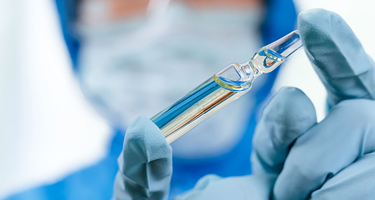Vaccine manufacturing: COVID-19 and beyond

In 2020, the biopharmaceutical industry set a historic pace at which new therapies have been taken from research to full-scale manufacturing and distribution in the race to find treatments for SARS-CoV-2, the virus which causes COVID-19.
After approximately a year of research and technology development, two RNA based vaccines, produced by Moderna and Pfizer/BioNTech respectively, received emergency use authorization in the United States and European Union. In China, emergency use has been granted for just one vaccine, produced by Sinopharm , and Russia has also granted one vaccine approval to date . A pipeline of more than 800 therapies are still under evaluation for how they may also be used to alleviate the effects of COVID-19 on different patient populations
In this interview, Nandu Deorkar, vice president of R&D, biopharma production at Avantor, shares insight about the different vaccines’ technologies and the lessons we can learn from the industry’s historic ramp-up from research to manufacturing.
So far, it would seem that DNA and mRNA vaccines have been the most successful modalities to inoculate against COVID-19. What has contributed to their success?
An array of therapeutics have been in development to address the COVID-19 pandemic, with five different vaccine modalities, all relying on different viruses or viral parts[1]:
- Recombinant protein vaccines
- DNA vaccines
- mRNA vaccines
- Non-replicating viral vector vaccines
- Inactivated vaccines
Recombinant vaccines are manufactured using well-established technology, proven to be both safe and effective, but take longer to develop. Unlike recombinant vaccines, DNA or mRNA vaccines use information from the genome of the virus to create a blueprint of select antigens.
Speed has been and will continue to be the biggest determinant in how quickly the world can begin to recover from the pandemic, first related to discovery and scale-up, now continuing the pace of manufacturing and distribution of the proven vaccines into the hands of medical professionals worldwide.
How did the availability of existing platforms help the progression of clinical trials?
In a typical clinical stage testing format, vaccines go through multiple years of testing before being approved for the general public. The vaccine for mumps in 1948 was the fastest developed prior to last year, taking four years from the collection of viral samples to an approved and licensed drug.[2] In 2020, modern technology allowed companies to accomplish the same in a quarter of the time.
The development period for COVID-19 vaccine candidates was substantially compressed by the use of modern platform technology to develop the vaccine in pre-clinical stages, followed by historically fast authorization by regulatory agencies for clinical trials. Moderna, as an example, initiated clinical trials within two months of sequence analysis of the virus of their new generation vaccine (mRNA-1273)[3]. This would have normally taken more than two years without platform technology to develop such a vaccine.
Download the full article to continue reading the interview
[1] Callaway, Ewen. The race for coronavirus vaccines: a graphical guide. Nature. 30 Apr 2020; 580(7805): 576.
[2]Mumps. Centers for Disease Control & Prevention (CDC). Webpage updated December 2020. Accessed February 2021.https://www.cdc.gov/vaccines/pubs/pinkbook/mumps.html#vaccines.
[3] Dangerfield, Katie. Moderna designed its coronavirus vaccine in 2 days — here’s how. 30 Nov 2020. https://globalnews.ca/news/7492076/moderna-coronavirus-vaccine-technology-how-it-works
Author

Dr. Nandu Deorkar
Ph.D., MBA, Senior Vice President, Research & Development – Biopharma Production, Avantor
Nandu Deorkar is Senior Vice President, Biopharma Production Research & Development for Avantor. He is responsible for innovation strategy and planning, and execution of new products and technology development. During his more than 25-year career in research & development, Dr. Deorkar has been leading teams working on various aspects of upstream and downstream bioprocessing, single use systems, chemical/polymer R&D, drug development, formulation, drug delivery technologies, process development, and technology transfer. He has published more than 30 articles and holds more than 20 patents. Dr. Deorkar received Ph.D. from Indian Institute of Technology, Mumbai, India and MBA in Marketing from Fairleigh Dickinson University, Madison, NJ, USA.

Solutions for vaccine manufacturing
We bring our regulatory, quality and technical expertise to virtually every step of production process to drive the efficiency that enables treatments to get to the patients and communities that need them, quickly and safely.
Customer support
Contact us
Ready to streamline your bioprocessing manufacturing workflows? Avantor Biopharma Production can help.